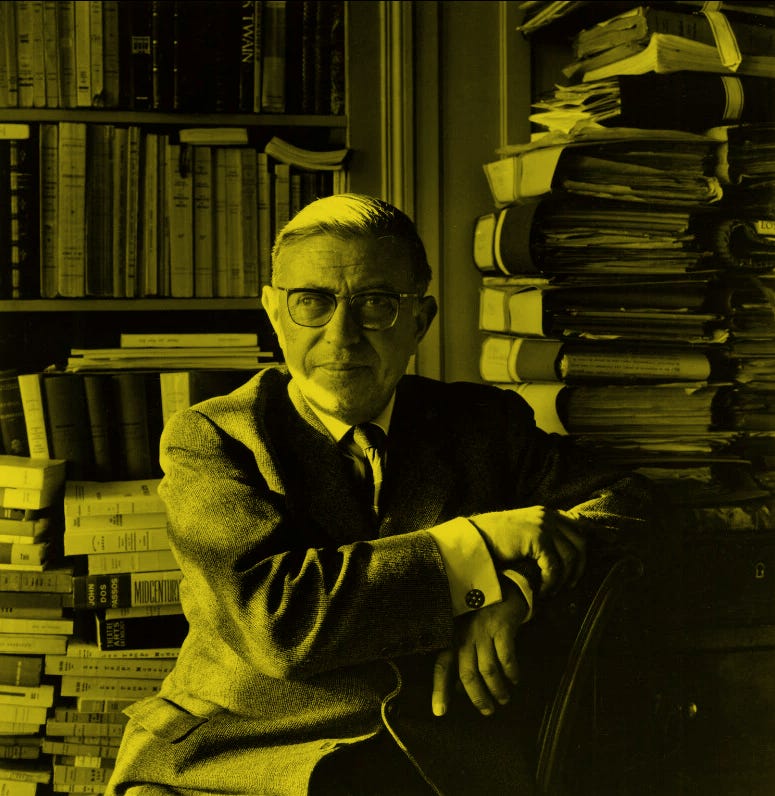NO EXIT
“[Zillow] and you’ll live—at least for a while”
As far as portents go, I’m not really sure what to make of a random copy of Sartre’s No Exit landing on my desk at Snake Dog’s downtown Los Angeles HQ. I thought we were living in a post-literate society. Why would a f*cking book appear on my desk at all? And why this old-ass French one? And why now?
One not to risk ignoring harbingers of any kind, I read the play. It’s a scant forty-seven pages, many of them quite funny. Three folks, post-life, trapped in an exit-less room for all eternity. No eyelids. No sleep. It’s “life without a break.” With ugly furniture.

But the play definitely brings up some sh*t. As many of my fellow Angelenos can attest, the beginning of 2025 felt eerily similar to the existential slog that was 2020. Fear. Masks. Conflicting public health information. Schools shuttered. Meetings and classes migrating back to Zoom. And getting busy Zillowing far-flung real estate like there’s actually any way out of this.
The impulse to isolate to some faraway place is strong. But Copper Harbor, Michigan can’t save me. Neither can Croton-on-Hudson, New York. Only you can. As Sartre writes, “alone, none of us can save himself or herself; we’re linked together inextricably.”
And yet, the Zillow fantasies almost always fling me further and further from my IRL community. Isolation masquerades as liberation set on two acres with cedar shingles and a Japanese soaking tub.
Hell might be “other people,” but we’re the best we’ve got. And a couple weeks of throwback pandemic-era mindf*ckery reminded me of that.
It’s the same tired old story. 1) Meet discomfort. 2) Go to escape.
That’s the addiction cycle, the assigning of value to a mirage. Anywhere must be better than here. A Zillow listing lets us project a discomfort-less existence onto a house. When we survey the subway-tiled bathroom, most of us don’t imagine having Norovirus in there. It reminds me of that first drink. It was always so full of promise. It was never, like, “Cheers, in eight hours I’ll be licking cocaine-laced lint out of the flipped-inside-out pocket of my rarely-washed canvas jacket.” I, for one, always imagined myself ending up somewhere much closer to the top of the world at the beginning of a night out.
In Sartre’s window-less, exit-less room, its attendant, the valet Garcin, teases his prisoner, “So you haven’t yet got over your—what-do-you-call-it—sense of human dignity?”
Seeking escape, I could lose mine over and over again. Seeking escape always led to the windowless room. The Swiss existentialist, Medard Boss, wrote, “addiction, whatever its form, has always been a desperate search, on a false and hopeless path, for the fulfillment of human freedom.”
The exit isn’t there, y’all. The “desperate search” for freedom results in anything but. “The lifestyle,” as it were, is ultimately so constricting that its antipode is “a newfound freedom.”
And, sure, Zillow is innocent enough, right? Unlike alcohol and drugs, it can’t lead to hospitals, jails, and institutions. Can’t it? Honestly, it probably already has.
The “desperate search” is a key component to a myriad assortment of second machine age dopamine reward systems. Think: LinkedIn, The New York Times app, Tinder, TikTok, Pornhub. What do they all have in common? The fallacy of escape. And how’s that going? Which study on the link between online life and increases in instances of depression, self-harm, and suicidality shall I quote for you?
And that’s what any attempt at escape from the “quote-unquote real world” hath wrought so far. And the accelerator set is just getting started.
At the risk of sounding hyperbolic—for the 97% of Zillow users who aren’t actually buying anything—every house on Zillow is a prison, at best. And a death trap, at worst.
I would be remiss not to point out that some people I know—and thousands I don’t know—lost f*cking everything but the clothes on their backs during the LA fires. That’s the kind of liberation from attachment I wouldn’t wish on anyone.
Something about entertaining dissociative real estate fantasies while the newly home-less search the same site for shelter feels a little indulgent.
And the reality is, most of us aren’t going anywhere.
The vast majority in Los Angeles can’t afford to. They’re stuck with the AQI they get. And the government they get, too. They don’t have the luxury of performatively musing on moving to Portugal and listing all the tech companies that they will now never work for on LinkedIn. The tone deafness of that kind of entitlement—when 2/3 of Americans say they are living paycheck to paycheck—is open to pre-qualified c*nts only. But that’s just one man’s Zestimate.
Here, I propose an alternate story. 1) Meet discomfort. 2) Go to connection.
Instead of running away, run to. Run to your family, your friends, your lovers. And you often won’t have to run far. They’re in your city, your neighborhood, your house, like, the one you actually live in right now. And they’re next to you in bed while you Zillow a better bedroom three thousand miles away. You can put your phone down. Liberation, it turns out, is not looking for the exit at all.

